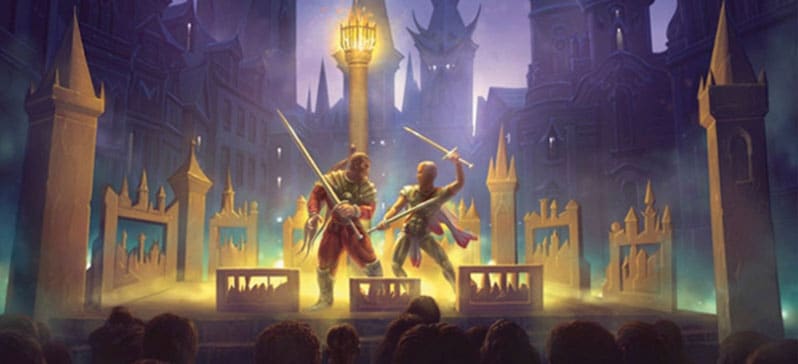Actor 5e
Published on August 28, 2023, Last modified on April 19th, 2024
Step into the spotlight and prepare for your grand performance—we’re taking a look at the Actor feat in D&D 5e!

John Avon - Wizards of the Coast - Thespian's Stage
What Is Actor 5e?
If your character is the type to steal the show, whether it’s through deception, performance, or just plain charisma, the Actor feat is your ticket to stardom. This feat allows you to increase your Charisma score, grants you proficiency in the Performance skill, and enables you to mimic voices and sounds you have heard. Ready to take center stage? Let’s dive in!
How Does Actor Work?
The Actor feat provides three main benefits:
- Charisma Boost: You can increase your Charisma score by 1, up to a maximum of 20.
- Performance and Deception Boosts: You get advantage on Deception and Performance checks when you’re trying to pass yourself off as someone you’re not.
- Voice Mimicry: You can mimic the speech of another person or the sounds made by other creatures. You must have heard the person speaking, or heard the creature make the sound, for at least 1 minute.
Let’s break down these benefits:
This first boon is straightforward, but somewhat restrictive. This boost will provide better social interactions and stronger spellcasting for certain classes, but may not mean a whole lot for classes that don’t plan to stack into Charisma.
Gaining advantage on Deception and Performance checks when trying to pass yourself off as someone you’re not is where this feat starts to get fun. This will happen at least once in every campaign (and much more than that for certain groups or campaigns). It also combos extremely well with the third ability, which allows you to mimic the speech of another person (or sounds made by other creatures)
Is Actor Good?
We gave Actor a C Tier rating In our 5e Feats Tier List, making it a below-average feat in D&D 5e.
This is a cool feat, if a little clunky. The Mission Impossible-style abilities are solid for infiltration, though there are spells that are similarly as effective. The fact that it is a half-feat certainly makes up for it a bit, but it’s questionable to choose a feat that a spell like invisibility can accomplish quite easily, if in a different manner.
Actor 5e Interactions
Disguise Self
This feat is amazing when you combine it with disguise self. This combo of abilities will allow you to not only look like the person you’re trying to mimic, but also sound like them as well. For certain infiltration situtions where you can’t just invisibility or misty step you’re way in, this is going to feel extremely effective. Combine that with advantage on Deception checks to pass yourself off as your mimiced target, and you’ll be a regular Ethan Hunt.
Mimic Languages You Don’t Know
Seeing as the mimicry effect allows you to mimic sounds made by other creatures, you don’t necessarily have to even speak the language you’re trying to mimic. Just repeat the phrases you heard when you were observing the target. Hopefully they weren’t saying anything that would be suspicious to repeat.
